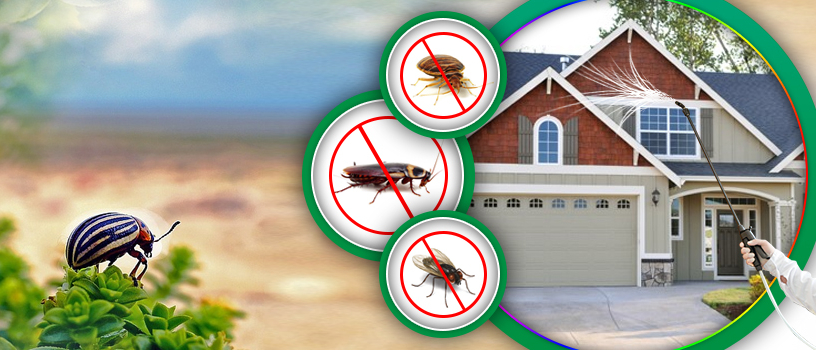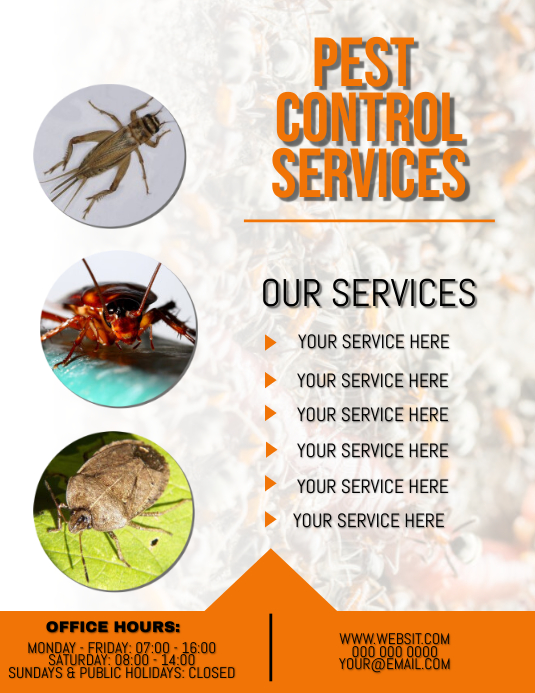Efficient Pest Control Auckland Services: Your Service to a Pest-Free Home
Wiki Article
Recognizing Various Types of Parasite Control Methods and Their Performance
The monitoring of bugs is a critical facet of preserving the health and integrity of various environments, from farming fields to residential homes. When thinking about bug control techniques, it is important to comprehend the diverse methods offered and their differing levels of performance. From chemical treatments to organic solutions, each approach offers special benefits and limitations. By exploring the subtleties of these bug control methods, a detailed understanding of how to resolve insect issues can be developed.Chemical Parasite Control Methods
Chemical pest control methods play a crucial role in effectively handling and eradicating pest invasions in different atmospheres. These approaches involve the usage of chemical substances to remove or discourage parasites such as rodents, weeds, and insects. Among the crucial advantages of chemical pest control is its ability to supply fast and targeted options to pest problems. By making use of specific chemicals that are designed to target specific parasites, this approach can help stop damages to crops, structures, and human health.However, it is essential to take into consideration the possible risks and drawbacks related to chemical parasite control approaches. Overreliance on chemicals can lead to the development of chemical resistance in parasites, making them harder to control in the future. Additionally, using certain chemicals can have damaging results on non-target organisms, the setting, and human health otherwise applied correctly.

Organic Pest Control Approaches
Utilizing all-natural killers and microorganisms to handle pest populaces successfully, biological insect control approaches use a sustainable and environment-friendly approach to pest monitoring. By introducing or promoting the activity of microorganisms that naturally victimize or contaminate bugs, such as ladybugs for aphid control or specific microorganisms for caterpillar problems, organic control can assist preserve insect populaces at manageable levels without the requirement for artificial chemicals. This method is particularly helpful for chemical-free farming techniques, as it avoids using possibly damaging substances while preserving plant health.
Physical Pest Control Approaches
While organic pest control methods concentrate on utilizing all-natural killers and virus, physical insect control techniques make use of mechanical and physical barriers to manage pest populations. These methods are usually considered eco friendly as they minimize using chemicals. Physical parasite control includes techniques such as capturing, utilizing obstacles like internet or displays, and literally getting rid of parasites from the location.Traps are typically used in physical insect control to record and get rid of bugs like rodents and pests. One more physical approach is the use of obstacles such as screens, nets, or fencings to protect against bugs from entering or infesting specific areas.
All-natural Insect Control Approaches
Incorporating plant-based repellents and all-natural predators is an essential method in applying reliable natural bug control methods. By encouraging the visibility of advantageous pests like ladybugs, lacewings, or predative mites, gardeners can naturally control pest populations. These predators feed upon usual yard parasites such as termites, caterpillars, and aphids, aiding to maintain a well balanced community without the requirement for chemical interventions.
Moreover, executing cultural practices such as plant turning, friend growing, and keeping correct plant health can likewise improve the efficiency of natural insect control techniques. These methods not just assist in protecting against parasite problems yet additionally promote biodiversity and overall community resilience. By integrating these all-natural techniques, people can successfully handle bugs while reducing environmental effect.
Integrated Insect Monitoring (IPM) Approach
Applying an Integrated Parasite Administration (IPM) method is necessary for successfully controlling pest populaces while reducing dependence on chemical pesticides. IPM is a comprehensive and sustainable method that combines various bug control approaches to achieve long-lasting solutions. This technique focuses on control, avoidance, and tracking to deal with bug problems in an eco-friendly way.IPM integrates organic, cultural, physical, and mechanical methods with the strategic and restricted use pesticides when required. By highlighting positive steps such as habitat adjustment, biological control, and exclusion, IPM intends to decrease parasite populations and their influence on the ecological community. Normal monitoring is crucial in IPM to examine pest levels precisely and determine the most proper control methods.
One of the key advantages of IPM is its ability to minimize the threats related to too much pesticide use, such as ecological contamination and injury to non-target microorganisms. Additionally, IPM advertises an extra holistic technique to pest monitoring by considering the overall environment dynamics. In general, the IPM technique supplies a sustainable and reliable remedy for pest control while promoting ecological obligation.
Final Thought
Finally, recognizing the different kinds of insect control techniques useful link and their efficiency is critical in successfully handling bug invasions. Chemical, biological, physical, and natural parasite control techniques each have their very own advantages and restrictions. Integrated Pest Monitoring (IPM) method, which incorporates various methods for lasting pest control, is progressively being identified as a environmentally pleasant and all natural remedy. By using a mix of these organizations, individuals and approaches can properly manage bugs while decreasing damage to the atmosphere.Chemical parasite control methods play imp source a crucial function in efficiently handling and getting rid of pest infestations in numerous atmospheres.Utilizing all-natural predators and virus to manage parasite populations properly, biological pest control approaches use a environment-friendly and lasting strategy to pest administration. By introducing or advertising the activity of organisms that naturally prey on or contaminate pests, such as ladybugs for aphid control or certain microorganisms for caterpillar invasions, biological control can help keep parasite populaces at convenient levels without the need for artificial chemicals.While biological parasite control techniques concentrate on utilizing natural killers and pathogens, physical parasite control methods use mechanical and physical obstacles to manage insect populaces. Integrated go to my site Bug Monitoring (IPM) strategy, which combines different techniques for lasting bug control, is increasingly being identified as a holistic and environmentally friendly option.
Report this wiki page